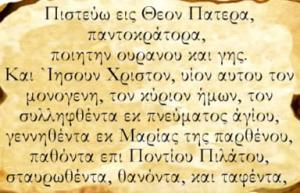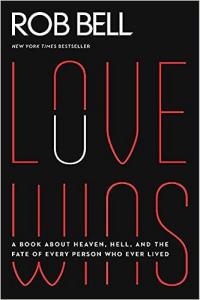
God of Love and Wrath
In the previous sections I offered evidence illustrating that primitive Christianity presented God with love and mercy, but also with wrath, judgment and personal accountability.
Part 2: Evidence from the New Testament
God is presented as love [1 John 4:8]. Jesus gives clear teachings about the love and forgiveness of our heavenly Father. However, there are also numerous clear passages where Jesus speaks of (or illustrates in a parable) wrath, judgment and a final accountability.
We also see plenty of evidence for judgment and accountability from the teachings of the other NT writings.[Read Part 2]
Part 3: Evidence from 80-140AD
The same presentation of wrath and final judgment is given during the generation AFTER Jesus and His disciples. This literary group is called “The Apostolic Fathers,” dated roughly from 80-140AD.
The early second century is quite important for this discussion. The NT documents had not yet circulated to a great degree, yet these early writers expressed the same views on this topic that is found in our NT documents. In fact, the early writers use very similar phrases in their descriptions of judgment. This underscores how closely the early church followed the oral “traditions” of the apostles’ teaching.
I had initially intended to present evidence in the later second and early third century to illustrate the continued consistency in the witness of the Christian writers. Passages could easily be gleaned from Justin Martyr, Irenaeus of Lyons and Tertullian. These three church fathers clearly present the same aspects of wrath and judgment. By the time we reach the early third century, Christian writers are obviously quoting from our NT documents, naming the writers as they go. [Read Part 3]

The Apostles’ Creed
While it is the mid-fourth century before the Apostles’ Creed appears close to it’s final form, there is a very early witness to what we think is the Roman Creed in the Letter to the Trallians (9.1-2) by Ignatius of Antioch. [ 1 ]
There is a similar reference in his Letter to the Smyrneans (1.1-2). The creed states that Jesus will return to earth at some point “to judge the living and the dead.”
Over the centuries this language has been accepted as an indication of final judgment and accountability. Towards the end of the fourth century Rufinus of Aquileia wrote his Commentary on the Apostles’ Creed. In his comments on the resurrection and everlasting life he writes:
Love Wins, by Rob Bell

In the midst of my reading and thinking about these concepts I found my copy of Love Wins. I must admit, I cannot remember how I came to have this book on my shelves and I had never opened it.
Since I have been deep into this topic and discussion for the last few months, I decided it was important to give this popular book a fair read.
Wow.
I remember hearing all the criticism when the book first hit the street. I never bothered to read it.
Love Wins is an excellent book.
While I have some criticisms, I found myself in agreement with most of Bell’s presentation. The stern criticisms I heard 10 years ago were unfair.
I expected Bell to push universalism. He did not.
I have no idea if Bell believes in universalism – honestly, I have NO idea. I do not follow him and I do not follow writers who hold to this position.
He never openly espoused this view in Love Wins.
What he does clearly write, in a very interesting way, is that God ultimately gives all men and women what they want. That is His judgment.
The main points I found in Bell’s book:
1. God created humans with an incredibly precious gift: free will.
We are free moral agents capable of following God’s character of beautiful love OR fully capable living a life of selfishness, bitterness and hate.
2. God is forever seeking His creation, trying to draw men and women back to His standard of selfless love.
3. But He allows us to have what we demand. And the sum of our choices in this life is what we will get in the next dimension. [Bell references C.S. Lewis, The Great Divorce. This happens to be my favorite of all the Lewis works I have read. See Note 2 below.]
4. God is completely and utterly DIFFERENT from us. His thoughts are higher than our thoughts. His ways are higher than our ways.
He is eternal – we are not.
There is so much about God that is beyond our ability to fully understand.
5. We do not know exactly what the other side will look like. While the biblical text gives us word pictures, God cannot be contained in any writing.
6. God is Love, AND God is Just. (NOT a binary proposition)
[I may be reading my already established position into Bell’s work on this point.]
I think most of us WANT God to be easy to understand…good luck with that.
This kind of talk can annoy. I understand.
I grew up in the home of a NASA rocket propulsion engineer.
“Dad, the world does not run on “0’s” and “1’s.”
The God I serve [the one in MY head] is utterly transcendent, beyond our understanding…AND genuinely immanent through the man Jesus [who is also “the Almighty”]. Zeros and ones cannot contain God.
CONCLUSION:
My purpose in this series was to present the textual evidence. Where the biblical text is clear I feel an obligation of fidelity.
The textual evidence clearly points to a God of love who also expresses wrath, judgment and personal accountability. The writings of the Apostolic Fathers confirm this reading, mostly offering the “traditions” handed down orally. And the next generation of Christian writers confirm this reading by clear and direct quotations from the texts that become New Testament writings.
Clement of Alexandria was my PhD focus [I read works by Origen and Gregory of Nyssa in my MLitt year], thus I am quite aware of the influence Origen had in this arena. After Origen things began to shift. The Eastern Church, especially the more intellectual writers, followed Origen in the development of apokatastasis. Many in our day are following this trajectory.
I am not saying “I am right and you are wrong.”
However, the textual evidence from the first 150-180 years of Christian history clearly supports the idea of final judgment and accountability rather than universalism.
God is Love AND “in righteousness He judges and makes war.” [Rev. 19:11]
By the way, this text is describing the rider on the white horse, called “Faithful and True” and is also the Lamb of God that opened this series.
NOTES:
1. I am NOT suggesting that Ignatius was quoting The Apostle’s Creed. My opinion is that the church in Syria (and perhaps Judea as well) have an early creed that provides the seed for the Roman Creed or a precursor to The Apostle’s Creed. After careful study of the letters of Ignatius, it is clear to me that Ignatius very likely does not have any New Testament texts. He might have a parchment with his own collection of “sayings of Jesus.” He might also have a “Paul” parchment, but it is highly unlikely that he has any canonical writings. It does appear that he quotes at least once from The Gospel of Peter or The Gospel to the Hebrews in his Letter to Smyrnaeans 3.2.
2. Bell lists The Great Divorce in his short bibliography. Several times Bell seems to be putting Lewis into prose.












